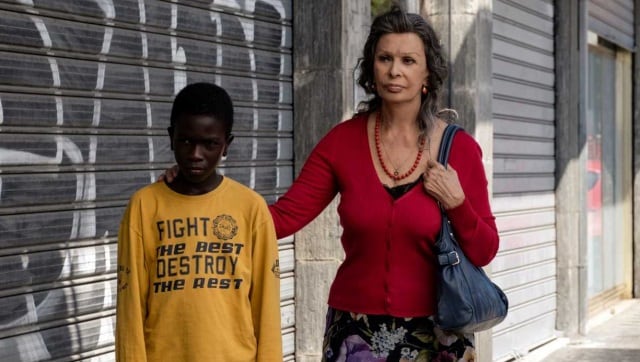Sophia Loren beams the story with light, without shrouding it altogether. The veteran actor knows exactly when to take a step back to let her co-star shine.
In her much-awaited comeback role in The Life Ahead, Sophia Loren plays a prostitute-turned-guardian. It’s the familiar mother-whore dichotomy, the easel on which art has painted its women for centuries. The Italian star has played both in many Vittorio De Sica films: she was a prostitute in Yesterday, Today and Tomorrow (1963), and Marriage Italian Style (1964); she was a mother trying to survive the horrors of World War II in Two Women (1960). In her new film, she is a woman still tormented by the horrors of Holocaust.
Loren is back in front of the camera because her son Edoardo Ponti is behind it. She is back to live the mournful life of Madame Rosa from Romain Gary’s novel, La Vie devant soi. Madame Rosa is an elderly woman who runs a sanctuary for the children of those treated like second-class citizens, from prostitutes to immigrants. In her small apartment, she feeds them, teaches them, and watches over them as their mothers do whatever they can to make ends meet. This makeshift family includes: Iosif, a Romanian boy seemingly abandoned by his mother; Lola (Abril Zamora), a Spanish transgender prostitute who lives in the apartment upstairs; and her toddler daughter Babu. The Life Ahead finds a resilient humanity in distress, where compassion emerges as a glimmer of hope for those living in the margins. However, with its many predictable turns and routine melodrama, the whole thing feels like a stencil tracing with oil painting aspirations.
At the request of her physician Dr Coen (Renato Carpentieri) and after much reluctance, Madame Rosa agrees to take in a new member, an orphaned 12-year-old Senegalese boy named Momo (Ibrahima Gueye). The reluctance comes from Momo having stolen her handbag during a visit to the market. On taking him in, she, however, tries to push him in the right direction by getting him to work with an Algerian shopkeeper Hamil (Babak Karimi). But he’s already found employment elsewhere. Selling weed for the local crime boss Ruspa (Massimiliano Rossi), he feels a sense of pride when he becomes the neighbourhood’s top dealer. He gets the father’s validation he desperately seeks from Ruspa, who’s himself separated from his son. This presents a timeworn dilemma to test if Momo will choose his surrogate family from the right or wrong side of the law.
Madame Rosa is a Holocaust survivor, and dementia has condemned her to reliving the horrors. She wears those horrors in her memory and on her skin. Unable to differentiate the past from the present, once-compartmentalised ordeals come to the forefront and invade her memories. In one of her dementia episodes, she rushes to pack up her bags, worried the Nazis are dashing up the stairs. She makes Momo promise never to let her be hospitalised, still shell-shocked by the nightmare of Auschwitz where prisoners were subjected to deadly experiments.
Momo wants to be loved (as a clunky metaphor in the form of a CGI lioness proves) but pushes away anyone who gets close to him. But he is intrigued by Madame Rosa. Iosif suggests the prisoner number on her forearm is her secret agent code. So, he follows her down to the basement, where she hides artefacts of her childhood memories. It’s her safe place, what Momo calls her “batcave.” In her care, even he feels safe and loved for the first time in a long while. Her failing health sparks a change in him, and sparks his still heart into beating. What was a stormy start to the relationship eventually evolves into a heartfelt one. They form an unlikely bond on discovering they’re more alike than different. Their traumatic past has redesigned the way they view the present — and they realise the only way to conquer their inner demons is by facing them together.
The camera, which has been in love with Loren perhaps since De Sica’s The Gold of Naples, can’t get enough of her. She says so much without saying a word. It’s a performance full of unspoken thoughts. With a mere gesture, she collapses inside herself into a universe of emotions and memories tightly kept under wraps. The closer she gets to Momo, the hardness gets chiselled into kinship.
She beams the story with light, without shrouding it altogether. The veteran actor knows exactly when to take a step back to let her co-star shine.
Gueye builds Momo from the ground up with a vulnerability. There’s pain and anger in his eyes, but he isn’t a defenceless young boy. He’s just trying to survive however he can. In a role that is completely unfeigned, Gueye matches Loren in this game of gestures and glances. Save for these performances, the pleasures of The Life Ahead are all extraneous: visuals of the sun-drenched coastal town of Bari, and the hip-hop bursting from Momo’s headphones.
Watching police lining up immigrants, and pulling them from their homes into the streets, brings a specificity to Bari’s refugee crisis that makes it feel like documentary footage. Yet, despite its good intentions, the film fails to convey the emotional reality of this crisis by keeping its narrative too tightly focused on Madame Rosa, rather than Momo. Thereby, the film brushes aside a far richer emotional arc in Momo’s confrontation with his past, and his emerging self. This curtails its visceral impact, from becoming a more scathing work on the plight of immigrants. Instead, it flattens the experiences of the displaced to a digestible weepie, one with a life-affirming message that audiences will surely eat up.
The Life Ahead is now streaming on Netflix.
Rating: ***
Find latest and upcoming tech gadgets online on Tech2 Gadgets. Get technology news, gadgets reviews & ratings. Popular gadgets including laptop, tablet and mobile specifications, features, prices, comparison.



